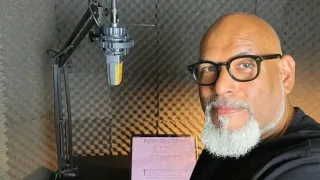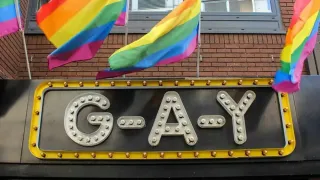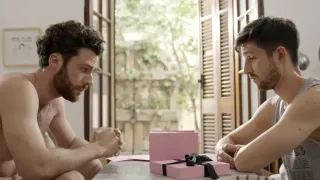April 19, 2015
Work Starts on LGBT Senior Housing
Kilian Melloy READ TIME: 5 MIN.
Graffiti covers the interior walls throughout Richardson Hall, a vacant historic Spanish Colonial Revival style structure at the corner of Laguna and Hermann streets built in 1925 as part of the now-defunct San Francisco State Teacher's College complex.
From a broken window pane in a second floor classroom wafts in the sound of construction on an adjacent major infill development named Alta Laguna where Wood Partners is building 330 units of housing, a portion of which will be below market rate.
Soon the banging of hammers will reverberate from inside the abandoned college building at 55 Laguna as crews with James E. Roberts-Obayashi Corp. turn its classrooms and ground floor auditorium into 40 units of affordable housing for LGBT seniors. There will also be a new corner retail space fronting Laguna carved out of the existing building and new offices for Openhouse, a nonprofit that provides services to LGBT seniors that is the driving force behind the project.
On Thursday Openhouse and its development partner, Mercy Housing California, will issue a notice to proceed on the rehabilitation of Richardson Hall, estimated to cost $16 million. It is the first phase in the construction of a total of 110 units of below-market-rate housing for LGBT seniors at the site.
"We are all very, very excited to see this construction and renovation get started," said Openhouse Executive Director Seth Kilbourn as he gave the Bay Area Reporter an exclusive tour of the building in late March. "There is a lot of excitement and anticipation."
Kilbourn, a gay man who once took a statistics class in the building back in 1989, said he encountered what looked like a "post apocalyptic" scene when he returned in 2013.
"It was quite a mess in here. It looked like people were working in here, and then one day, they up and left," recalled Kilbourn, who believes the last use of the building was for mock disaster training.
As Ramie Dare, a real estate developer with Mercy Housing, unlocked the doors for a sneak peek at the building, she said reports from a structural engineer hired to assess the property found no damage from the 1989 Loma Prieta earthquake that rocked the Bay Area.
"It's in pretty good shape," said Dare, who 20 years ago also attended a class in Richardson Hall. "Because it's a city landmark, we will restore everything on the exterior," from the fenestration to the figures above the existing Hermann Street entrance.
"I am really excited to work on it," said Dare, a straight ally. "I am really flabbergasted this doesn't already exist in San Francisco. We are going to add a lot of value to the community by building LGBT senior housing."
Work on Richardson Hall should be completed by the spring of 2016, with the first residents moving into their units by next summer. Seniors age 55 and up, regardless of their sexual orientation or gender identity, wishing to live there who meet the affordable housing requirements will be able to enter a lottery for the units next winter.
Charlie Levan, 67, a gay man who has lived in San Francisco since 1970, hopes to be among the first seniors to move into the revamped building. He has been on waiting lists for three existing senior housing complexes in the city since 2013.
"My roommate and I have lived together 13 years. We get along great, but eventually my health will be compromised in some way," said Levan, who is single and volunteers at Openhouse. "I am OK now, but I don't want to burden anybody else."
Yet with an estimated LGBT senior population of more than 25,000 in San Francisco, and with housing prices some of the most expensive in the nation, Levan said he knows there will be great interest in the Openhouse units and that his chances of being selected to move into 55 Laguna are "slim to none."
"I wouldn't mind living in an apartment building like the one I have been with all straight people, but it would be nice to be with all gay people," he said.
The city of San Francisco has already contributed upwards of $8 million toward the first phase of the project. The remaining funds are coming from Bank of America through a program administered by the California Tax Credit Allocation Committee, which encourages private investment in affordable rental housing.
Construction on the second phase of the project, which entails building a new $24 million structure designated as 95 Laguna on what is now an old parking lot, is slated to commence in 2017. Seniors age 62 and over will be able to apply for the units - the state raised the age limit after financing was secured for the Richardson Hall rehab - with a move in date sometime in late 2018 for the selected residents.
The seven-story building will contain 70 units of housing as well as an expected 7,500 square foot senior center, with activity areas and a dining room, where Openhouse plans to provide services to residents and any LGBT senior living in the city. It is currently working with its architect, Van Meter Williams Pollack, to finalize the design.
"This is also a new home for the whole community really," explained Kilbourn. "People may lose sight of that fact when they are looking at the designs and think it is just affordable housing that is not for me. We will have all these expanded services at the building for everybody."
A Long Time Coming
The idea for the project was born 17 years ago when Marcy Adelman, Ph.D., and her late partner, Jeanette Gurevitch, founded Rainbow Adult Community Housing. After Gurevitch's death in January 2003, the agency rebranded itself under the name of Openhouse, which was selected through a community charette process that Gurevitch participated in.
The housing plan languished for years as the agency cycled through executive directors, curried public support, and hunted for a site. In the meantime, the agency built up its services for seniors to keep them housed in their own homes and turned to training providers on the needs of LGBT seniors.
Then the UC Berkeley Extension announced in 2004 that it was entertaining development offers for its campus at 55 Laguna due to moving to a new home downtown. Developer A.F. Evans emerged with the favored proposal, which included teaming up with Openhouse to develop up to 80 units of market rate housing for LGBT seniors with 20 percent set aside as affordable.
By 2008 the plans had evolved to include 88 units of LGBT senior housing, all of which would be affordable, and won the needed city approvals. The next year, amid a worsening recession, A.F. Evans went bankrupt, and Wood Partners took over the 55 Laguna project.
It submitted new plans for city review, and by the time the current iteration of the entire infill project was approved in 2012, the LGBT senior housing component had grown to 110 units.
Due to the insistence of neighborhood groups and housing activists, Openhouse and its development partners agreed to rent all of the apartments as affordable. It has a 99-year lease at the property and has vowed to keep all of the units at below market rate for as long as it oversees the housing project.
"As you can imagine, I am completely thrilled. I am delighted that the housing piece of Openhouse's mission and vision is about to happen," said Adelman, 68, who does not intend to vie for one of the units in the building. "We are on the precipice to really finally realize our dream around building housing for LGBT seniors."
She stressed that any senior interested in moving into the 55 Laguna project should begin the process now to become eligible for the lottery.
"It is very important for everybody, even if just slightly interested, to get involved with the lottery and get on the list so they have a real chance to win that lottery and be in that housing," said Adelman. "Otherwise, they will have no chance at all."






